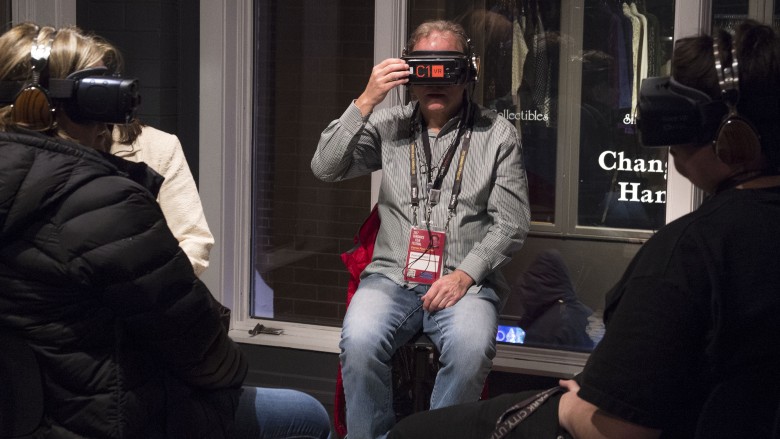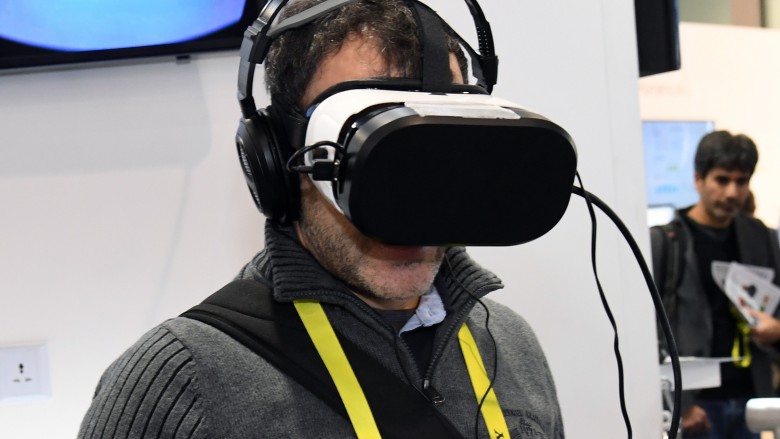Ways VR Gaming Could Become A Health Hazard
In addition to making the user look like they're trying to digest a Virtual Boy through their foreheads, this new generation of virtual reality headsets are plagued by a host of dangers, both hilarious and disconcerting. Remember — we're still beta testing this cutting-edge hardware with our faces. That's pretty sweet, but it's also worth a moment of sober reflection that, no matter how cool the new Resident Evil VII trailer is, healthy bodies and faces are more important.
Screen door effect
As anyone who has ever tracked Pac-Man across the insides of their lids can attest, patterns burn into eyes much faster than they burn into monitors. Part of this has to do with how the eye filters out static information (no need to waste brain cells on pixels that aren't moving), but the up-close and personal design of most VR headsets can greatly exacerbate this problem. In this case, miniscule gaps between pixels can, over time, burn a static grid into a person's sight. While it fades with rest, the appropriately named "screen door effect" has been linked to headaches, nausea, and other symptoms of motion sickness. While symptoms tend to fade quickly after use, some early adopters have reported still seeing the burn-in after a full night's sleep.
Thankfully, advances in display resolution should eventually make this effect as much of a thing of the past as CRT burn-in — a mere side effect of imperfect technology. Eventually, the necessity for negative space between pixels will be resolved, and humanity will be free to lose themselves in lotus-eating machines without a griddle imprinting itself across the backs of their eyes.
VR sickness
VR sickness, simulator sickness, and motion sickness all occur when the body experiences a difference between perceived and actual motion. The inner-ear mechanisms at play are much too complicated to explain here — otherwise we would, because we totally understand them perfectly.
Since it was first observed in 1957, some 40% of all military pilots reported feeling some amount of motion sickness after using flight simulators. Most common in applications that feature a lot of movement, designers have discovered that providing a fixed point of reference in-game can help delay the onset of symptoms by an average of 94 seconds. In most military simulations, it takes the form of a cockpit, but at least one study successfully deployed a digital nose.
So if you ever feel motion-sick, focus your eyes on the furthest point you can find. Breathe slowly and deeply and, if symptoms persist, find a bucket. This is just one of the indignities humanity must bear in the quest to perfectly recreate the Trench Run from Star Wars.
Past Pointing
Those exiting in virtual space, and those with cerebellum problems, both exhibit issues with the motor skill known as "past-pointing." Namely, both groups exhibit problems with their ability to judge relative distance in space, like Mr. Forgot-How-To-Football pictured above. There are a variety of tests that measure the body's ability to put itself where it thinks it is, and prolonged VR exposure monkeywrenches all of them. You might know it better as "hand-eye coordination," or even "not being a clumsy oaf your whole life," if you prefer scientific jargon.
When it comes to VR, focusing on something too close to your eyes for too long interferes with your ability to accurately judge where things actually are in relation to your body. VR headsets cause actual measurable shifts in neurological function, meaning that changing between virtual space and real life will take some getting used to. The question remains if frequent, long-term use will cause chronic coordination issues, and if so what threshold of use can be considered safe. Basically, as is true with most things in life, if it hurts, stop doing it.
Lazy eye
Canny readers will recognize many similarities to early concerns about the 3DS: namely, that prolonged exposure to simulated depths will exacerbate pre-existing visual anomalies. While the 3DS certainly failed to produce Dickensian levels of childhood ailments, strapping the screen scant centimeters from young eyes might have a more pronounced impact.
Ultimately, focusing the eyes on anything is exercise, and if exercise is done frequently enough, it has a lasting impact. Muscles and tendons can pull eyes out of alignment, especially if the person spends 3-4 hours a day training it to go further out of alignment. If a child has latent visual problems, like intermittent exotropia, it's likely the unnatural action of focusing on a head-mounted display could exacerbate those underlying conditions. Some of these changes could be permanent, resulting in conditions like lazy eye, or double vision. Combine that with poorly-fitted headsets or misaligned screens, and you've got the recipe for one walloping headache.
Place and plausibility illusion
One fascinating study trapped a person in a virtual world for 24 hours, presumably to give the writers of Black Mirror something to work with. Unsurprisingly, the subject quickly began to confuse the real and imaginary, a failing of something experts call the Place and Plausibility Illusion. This should be familiar territory to anyone who has ever tried to ctrl-F a textbook or double-clicked a doorknob — the behaviors we repeat so often become second nature, almost ritual-like in how quickly they come to hand.
Effectively, the "Place Illusion" refers to the sensation of existing within a known fictional environment, while the "Plausibility Illusion" refers to our belief in the events we're witnessing. If both illusions are broken, you become aware that you're a nerd sitting with a smartphone balanced on his nose, watching CGI puppets dance on broken strings. But when it succeeds, you will find yourself believing wholeheartedly that Sonic is your roommate, and he wants to kiss you.
Literal brain shutdown
There are a handful of phrases calculated to terrify. "Contagious heart disease," for example. "Goliath bird-eating spider" for a second. "Brain Shutdown" sounds like the latest Magic Card to end a friendship, but it's real and scientists have observed it happening.
By measuring the hippocampus activity in VR-enabled rats, scientists noticed a 60% decrease in brain activity related to location. Over half the neurons in the hippocampus simply ceased functioning as soon as the mouse began gaming. Something about navigating a virtual world just failed to engage the brain as much as a real maze. If rats, nature's maze wizards, lose 60% of their capacity to navigate a maze, what impact is VR going to have on us? Will pilots using headsets to control drones have 60% less of a map than if they were there in the flesh? Would you trust a surgeon to only look at 60% of what they're operating on?
Tripping hazard
There's a reason industry demonstrations often use a mic stand to hold the cable above the player: it's a major tripping hazard. Video games and cables have been causing trouble since "ergonomic design" meant "make the rectangle sharper," but the price tag attached to most modern game consoles has upped the drama of navigating dorm rooms a thousandfold.
Any sufficiently involved game will have players ducking, dodging, weaving, and entangling their feet in a nest of plastic snakes. If finding enough room to successfully set up a Kinect gave you problems, designing a room to accommodate for hazards you're willingly blinding yourself to should provide a delightful exercise in futility. What are you removing from your life in order to make room for VR software? Is the market demographic only "people with a spare bedroom," or does Silicon Valley expect its customers to empty their living rooms every time they want to play Angry Birds VR?
People and walls
Do you live in an apartment with furniture? Animals? Other humans? If so, VR headsets provide the perfect plausible deniability to roundhouse kick them off a porch. Beyond just stumbling over the device itself, any modern office attempting to replace desktops with VR headsets will find themselves awash in accidental assaults. Anything within arm's reach will be swatted down with an accidental swing of the arm while the subject reads e-mail, oblivious to the chaos they inflict upon the world.
While many headsets now feature safety systems designed to prevent mid-game collision, no tech is perfect, and shutting out the external world is always going to carry the risk of it asserting itself upon you at inopportune moments. Hopefully, those moments won't hit back, assaulting a target you can't see is much easier than defending yourself from one.
Close work causes nearsightedness
Spectacles have been associated with nearsightedness since the days of kings and rampant gout, and for good reason. Years of pressing screens and books in your face absolutely causes nearsightedness, and the effect is stronger in children, whose muscles have yet to finish developing. Consider this: 53% of college-graduating nerdlords wear glasses, compared to 24% of people with no high school education. If books and screens can cause such a marked shift in perspective, what further effect will headsets have?
Ultimately, the cost of being on the forefront of technology is that, as an end user, you are also a guinea pig. The technology is shifting so rapidly, medical science hasn't had the time to study its effects. We won't know what it does to us until we experience it firsthand. In that case, maybe it's best to exercise discretion and tell children to take it easy until they at least graduate first.
Vergence-Accommodation conflict
The conflict arises like this: The eyes want to focus on the screen directly in front of them. The technology tricks the eyes into focusing "beyond" the screen, at a simulated focal point a good distance beyond what you're actually looking at. Normally, the brain automatically couples distance (vergence) with focus (accommodation), but VR headsets shortcut this coupling by showing each eye a slightly different picture. The vergence remains stationary several inches from your eyes, but your eyes' accommodation shifts as virtual objects move around you. A normally paired operation is suddenly forced to act independent of each other in a way the body isn't naturally designed for.
Imagine having to operate both sides of a bicycle independent of each other. Something normally intrinsically connected is suddenly up to manual control, so while you can learn and adapt to this new process, it strains parts of the body unused to this new and unfamiliar load.
Some games might cause PTSD
While the University of Southern California has shown promise using VR to treat PTSD with their Bravemind program, some alarmists have called attention to the possibility that VR, especially war-and-horror-based VR, might someday CAUSE PTSD. Who would say such a thing, you ask? None other than Mike Rothenberg, VR pioneer and head of River Accelerator, the nation's only VR-specific investment and development group. For someone with such a financial stake in the success of VR, he'd have no reason to go about spreading idle fears, so we're inclined to trust his expertise in the matter.
Perhaps the most common rebuff gamers make as to speculation about the impact of digital violence is that it doesn't emotionally affect the player. Either the audience is desensitized to the practice, or the game is insufficiently engaging, AKA boring. The good news is, the immersive nature of VR will make boring games much more difficult to make. Take Resident Evil VII for example — if a man with a chainsaw leaping at you doesn't trigger an emotional reaction, what will? Thing is, at what point does a simulation become so convincing that it leaves a permanent scar?
Isolation
Confirming what everyone already knew about shut-ins, medical science finally established a connection between isolation and straight-up dying. Turns out evolution designed a social animal, not a social media animal. We need physical contact, we need community (like you handsome readers!) ... we just plain need people, and deprived of companionship, we fade and die. VR isn't a dark and evil force, cleaving people from their real lives or anything, but its power is real and must be respected. The threat of games have always been that they are designed to be more compelling than real life, and with advances in technology making the ability to just check out of reality more commonplace and affordable, abuse will rise.
MMOs have already resulted in a myriad of deaths so depressing, they're frankly not worth linking to. Outside of death, most every gamer knows at least one person whose grades or relationships have suffered for the sake of a game. This is by no means malicious, but games are designed to be the ultimate reward, and humans are habit-forming creatures if nothing else. Taking virtual reality games seriously means we also need to get serious about the potential for virtual reality addiction.








